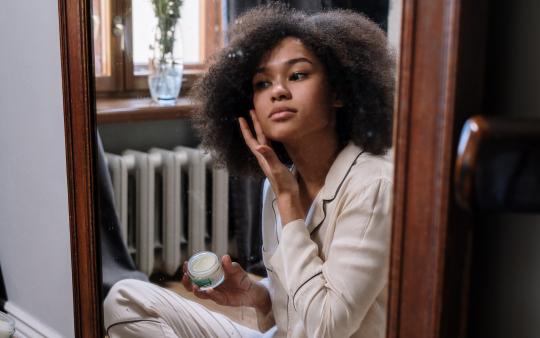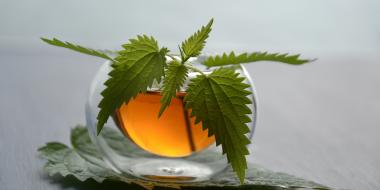Acne, typically thought of as an annoying skin problem in our teens for many of us, quite commonly persists into adulthood and can follow us through our 20s, 30s, and beyond. As a multi-faceted condition that has a variety of causes and treatment considerations, it’s supported best with personalized care. Some of the most common causes of adult acne range from lifestyle choices to hormonal and skin hygiene considerations. The goal of this article is to help you understand some basic foundations for supporting your skin while also educating you about other factors that may require further investigation for personalized care.
LIFESTYLE HEALTH
Understanding how lifestyle habits impact acne is one of the most foundational aspects of supporting clearer skin. Specifically, the foods we choose to eat can have a massive impact on how our skin responds and can result in the perfect environment for breakouts. Foods such as dairy products, milk, cheese, yogurt, ice cream, and more have significant evidence that indicates they worsen breakouts.1 At the skin’s cellular level, dairy increases something called insulin growth factor 1 (IGF-1), which can cause an increase in inflammation and sebum production in our skin. Foods high in sugar or a high carbohydrate-focused diet will also increase IGF-1 production. With increasing inflammation and oil production in the skin, there is a high likelihood of seeing an increase in the severity and frequency of acne lesions. Opting for a whole food, balanced diet and limiting dairy consumption can do wonders for supporting skin health.
While working on supporting our diet, it’s also important to consider the role of the hormone insulin in the health of our skin.2 Eating well and working to balance our blood sugar levels is something to consider if you have persistent acne breakouts. Insulin, a hormone made by the pancreas, acts to balance the body’s blood sugar levels. Insulin resistance or an imbalance in blood sugar regulation can commonly occur due to lifestyle/dietary habits, or for women with hormonal concerns such as polycystic ovarian syndrome (PCOS). Poorly balanced insulin levels can be a culprit for acne as it can increase inflammation and oil production in the skin. Determining how well you are balancing your blood sugar can be easily done through blood work testing with your MD or ND. They can work with you to optimize your insulin levels through diet, movement, or with further supplemental or pharmaceutical interventions if needed.
HORMONAL HEALTH
Sex hormones, androgens specifically, have been linked to acne lesions.3 With excess androgens, you may not only experience acne, but can also experience excessive hair growth in unwanted areas or androgenic alopecia and female pattern hair loss (FPHL). Elevated androgen levels (which are commonly seen in conditions such as PCOS), can cause an increase in skin inflammation and clogging of pores to create a perfect environment for breakouts. Testing androgen levels is another easy blood work test that can be requisitioned by your health care practitioner to help determine whether this is a contributing factor for your acne.
Stress levels are another hormonal factor that would be important to consider if you’re struggling with acne.4 Cortisol, your stress hormone, is released when we are overwhelmed and feeling stressed out. It has been shown that cortisol can alter the health of our gut microbiome and increase intestinal permeability; this can result in skin inflammation.5 Cortisol, unfortunately, can also cause an increase in oil production in the skin, and it, therefore, increases the risk for breakouts. Managing stress is key for helping support not only your overall health, but also your skin’s health and acne prevention. Working to develop your stress management strategies is essential for keeping stress (cortisol) in check. Implementing self-care routines such as journaling, intentional movement, meditation, or prioritizing fundamentals (such as quality sleep) can all be beneficial for stress management.
SKIN HYGIENE
While the focus of clearing your acne should always be on understanding the root cause—whether that be hormonal, lifestyle-based, stress, or other health concerns—it’s also essential to address your daily skin care routine, from topical solutions to general hygiene and care. Cleansing your face twice a day is considered the ideal frequency to help with acne prevention. In addition, keeping your skin well-hydrated is essential for preventing breakouts, as having a damaged or dry skin barrier increases the risk for acne. Including personalized topical care products, such as the commonly recommended salicylic acid, benzoyl peroxide, retinol, niacinamide and others, should also be considered with your skin-focused health care practitioner.

Your skin is your largest organ and supporting its health is important not only for the prevention of acne lesions, but for many other aspects of your health as well. Assessing your personal dietary choices, as well as your skin care hygiene, are excellent foundational starting points for preventing acne. Remember to work with your skin-focused health care practitioner to assess for hormonal considerations through testing, which will allow for personalized support in clearing your skin.
GLOW-UP SMOOTHIE
Adding this dairy-free green smoothie into your routine can help support balanced blood sugar levels and will provide an antioxidant-rich, hydrating option for your day.
- ½ c frozen or fresh cauliflower
- 1 cube of frozen or fresh spinach
- ½ c frozen or fresh blueberries
- ½ an avocado or ½ c frozen avocado
- 1 scoop of vegan-based protein powder of choice
- Add coconut water for desired consistency
Consider also adding in pineapple or any fruit of choice. Natural nut butters are also a great, healthy fat addition.
Blend and enjoy!
For references visit ecoparent.ca/TWF/LATESUMMER22
You May Also Like: Skin Care Ingredients and Facial Products, Why Do We Need Water For Healthy Skin?, Hormonal Acne and Natural Skin Care.






